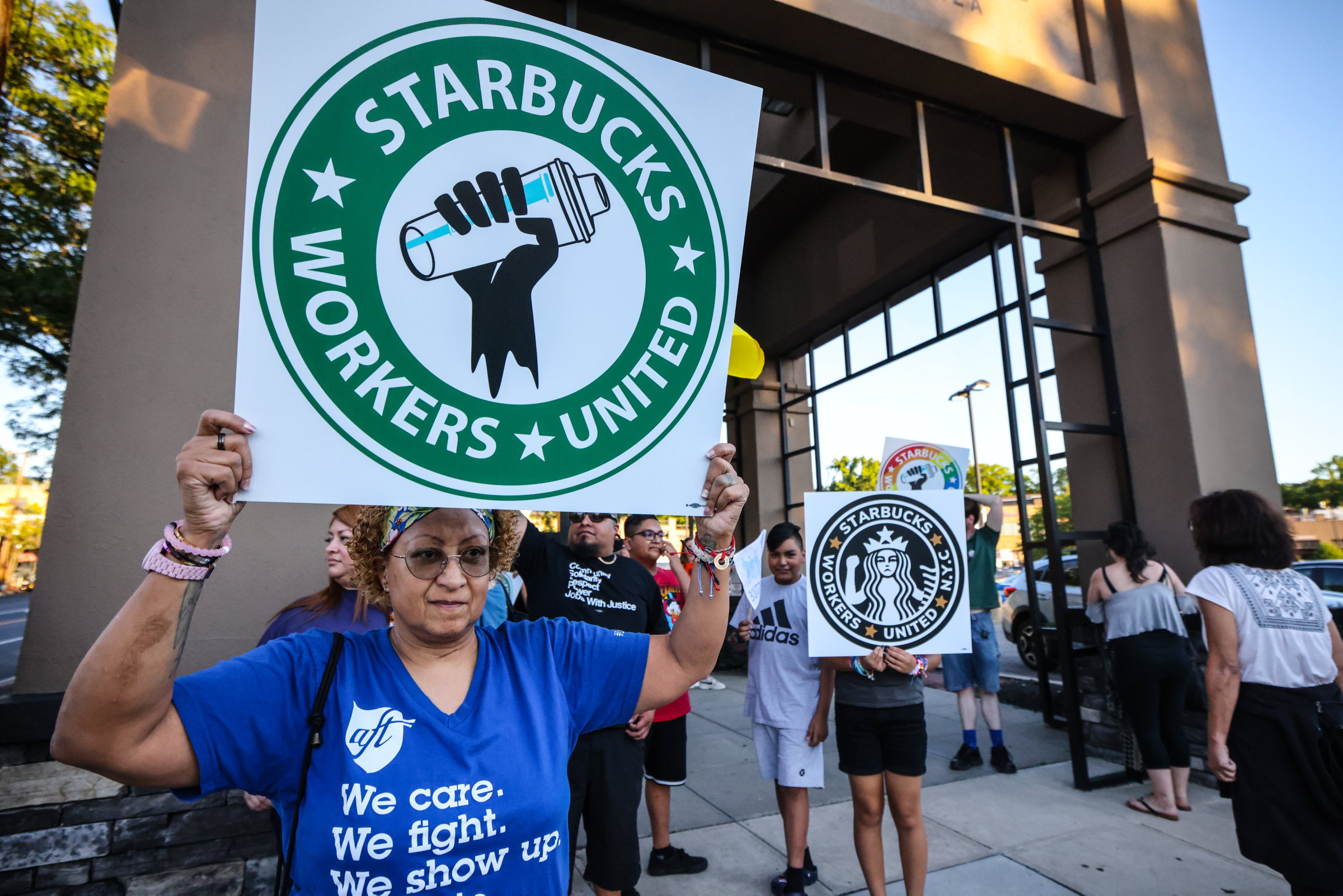
The U.S. Supreme Court on Tuesday appeared to side with Starbucks in its request to limit the authority of a government labor board in determining whether companies are required to reinstate fired union workers, potentially raising the threshold for those seeking recourse against companies accused of obstructing unionization efforts.
The labor law case stems from Starbucks’s challenge to a federal district court’s 2022 decision ordering the company to rehire seven baristas who claimed they were fired for attempting to unionize at a Memphis store.
The Seattle-based coffee chain said the move was legally justified and that the employees were fired for security violations after they allowed TV news crews into the store after closing for interviews about their unionization efforts. But the National Labor Relations Board (NLRB), a federal agency tasked with overseeing labor relations, sided with the workers that they were illegally fired under the National Labor Relations Act (NLRA) and issued a complaint against Starbucks. (Five of the seven workers are still employed at the Memphis store.)
During oral arguments before the Supreme Court on Tuesday, the majority of Justices across the ideological spectrum appeared sympathetic to Starbucks' position, suggesting that the NLRB held too much power over the labor dispute in the Memphis case. Justice Neil Gorsuch questioned the NLRB’s role in regulating union battles with companies and challenged its authority to force companies to rehire union organizers.
"In all sorts of alphabet soup agencies, we don't do this… So why is this particular statutory regime different than so many others?" Gorsuch asked, echoing concerns from Starbucks about the consistency and fairness of the legal framework governing labor disputes.
Read More: Supreme Court Will Hear Challenge to Idaho’s Near-Total Abortion Ban
The Memphis case has become a focal point in the ongoing struggle between worker’s rights and corporations, raising a pivotal question about the limits of government intervention in labor disputes and the ability of employees to organize freely.
In the company’s petition, Starbucks asked the Supreme Court to make it more difficult for the federal government to seek injunctions when a company is accused of violating labor law. The company contends that stricter standards are necessary to ensure a fair and balanced approach to resolving labor disputes, safeguarding the rights of both employers and workers alike.
Austin Raynor, the attorney from the Justice Department representing the NLRB, pointed out that the agency pursued the injunctions in only a small fraction of the 20,000 unfair labor charges it received last year. “This isn’t a case where the board is engaged in abuse or bringing all sorts of claims before courts,” Raynor said. His point appeared to convince Justice Ketanji Brown Jackson, who suggested that “this is not sounding like a huge problem.”
Jackson also appeared sympathetic to NLRB’s argument that it was given the authority by Congress to conduct investigations into allegations of unfair labor practices. “We’re in the context of a statute in which Congress has given the board the ability to determine the merits and—at least in the first instance—the ability to make the investigation,” Jackson said.
The oral arguments took place not long after Starbucks announced in February that it had reached an agreement with the union seeking to organize its U.S. workforce to create a "framework" to guide organizing and collective bargaining and potentially settle pending legal disputes.
Hundreds of complaints have been lodged with the NLRB against Starbucks, alleging labor violations like dismissing union advocates, conducting surveillance on employees, and shuttering stores during labor drives. Starbucks has refuted these accusations, asserting its adherence to labor laws and affirming its commitment to upholding employees' freedom to decide on unionization.
The focus on labor unions comes amidst a broader resurgence of labor activism, fueled by President Joe Biden's pro-union agenda and recent victories in key industries. More than 400 of Starbucks’s 9,600 company-operated U.S. stores have voted to unionize with Starbucks Workers United since late 2021, though none of these stores have reached a labor agreement with Starbucks.
More Must-Reads From TIME
- The 100 Most Influential People of 2024
- How Far Trump Would Go
- Scenes From Pro-Palestinian Encampments Across U.S. Universities
- Saving Seconds Is Better Than Hours
- Why Your Breakfast Should Start with a Vegetable
- 6 Compliments That Land Every Time
- Welcome to the Golden Age of Ryan Gosling
- Want Weekly Recs on What to Watch, Read, and More? Sign Up for Worth Your Time
Write to Nik Popli at nik.popli@time.com